![]()
Logion 3: “If those who guide you say: Look, the Kingdom is in the sky ...”

Shri Mataji Nirmala Devi was
Christian by birth, Hindu by
marriage, and Paraclete by duty.
"The Paraclete represents direct,
intimate divine intervention,
supporting and teaching
believers and challenging the
world, as Jesus did.” (D. Stevick
Jesus and His Own, 2011, 290)
And when He starts He is not going to ask you to take any Realization. No one is going to be bothered whether you are going to hell. He will just sort out.
But those who have got Realization will enter into the Kingdom of God. You have to enter into the Kingdom of God here, as I say, in the Seventh Chakra.”
THE MOTHER: Messiah-Paraclete-Ruh-Devi
The New Age Has Started, Houston, USA—Oct. 6, 1981
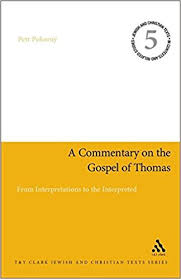
3 32,18b-33,5s
(1) Jesus says:
“If those who lead you say to you:
‘Look, the kingdom is in the sky!’
then the birds of the sky will precede you.
(2) If they say to you: ‘It is in the sea,’
then the fishes will precede you.
(3) Rather, the kingdom is inside of you,
and outside of you.”
(4) “When you come to know yourselves,
then you will be known, and you will realize
that you are the children of the living Father:
(5) But if you do not come to know yourselves,
then you exist in poverty and you are poverty.”
There are many gaps in the Greek version in P.Oxy. 654, 9–21, and it is most probable that instead of “The kingdom is inside you” it reads “The kingdom of God is inside you.” There is a similar omission of the word “God” in log. 27. The Coptic translator shortened the text.
The third saying demonstrates by parables that salvation means an inner transformation and the kingdom of God cannot be bound to a certain space. Lead may carry a pejorative meaning such as “drag” or even “mislead.” Look often introduces an important statement, as in Luke 17:20-21 and the semantic axis sky and sea is well known in Bible in connection with the theme of the nearness of God... Human beings have to know themselves...
“Inside you and outside you” is most probably an expression of the idea that the divine kingdom is spiritually present inside the spiritually reborn person, but at the same time it is present everywhere in the divine area: see logia 2, 51, 96, or 113...
The meaning of the saying is: do not be lead astray, concentrate on what is essential for salvation.
A similar theme (the warning not to turn away from what is essential for salvation) can be found in Mark 13:21-23: “And if anyone says to you at that time. 'Look! Here is the Messiah' or 'Look: There he is'—do not believe it.” The difference is that in Mark 13 the saying relates to the expectation of a Messiah and warns not against a nonspiritual concept of the Messiah but against false identification of him.
Logion 3, by contrast, contains instruction on how to interpret the expectation of the fulfillment of the eschatological promises; it is similar to log. 51 or 113.
Those who stress the eschatology of the present in Jesus' teaching see this saying as one of the pillars of their theory that Jesus was a teacher of the cynic kind, as discussed above in the introduction. In some respects it reminds us of the interpretation of Jesus' teaching suggested by the famous biblical scholar Charles H. Dodd even before the Nag Hammadi texts were published. We cannot interpret this as a mutilation of Jesus’ teaching a priori, for although Jesus admittedly expected the imminent coming of the kingdom as an eschatological and cosmic event of absolute validity, he also mentioned the present impact of the coming kingdom. For example, in the parable of the sower (Mark 4:1-9; log. 9) we find the eschatological future as the time of harvest, but the present sowing as the moment of decision.”
A Commentary on the Gospel of Thomas
Petr Pokorny, T&T Clark; Reprint edition (December 22, 2011) p. 39-40
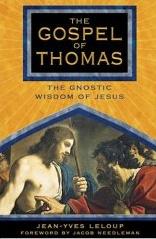
LOGION 3
“Yeshua said:
If those who guide you say: Look,
the Kingdom is in the sky,
then the birds are closer than you.
If they say: Look,
it is in the sea,
then the fish already know it.
The Kingdom is inside you,
and it is outside you.
When you know yourself, then you will be known,
and you will know that you are the child of the Living Father;
but if you do not know yourself,
you will live in vain
and you will be vanity.
(CF. MATT 24:26-27; MARK 13:5-7; LUKE 17:21; DEUT 30:11-14; ROM 10:6-8)
This logion tells us that the Kingdom is the presence of the Spirit of God within us. It is not to be sought exclusively in the outer, and it is not to be sought exclusively in the inner. It invites us to move out of the dualism that forms the climate of our ordinary consciousness.
This climate is one of oppositions, antagonisms, and exclusions. For example, we know the harm that is created by phrases such as "no salvation outside the Church.” When the term church is understood in merely an institutional sense, then there are those inside it, and those outside it—which means that most of humanity is excluded from salvation...
We begin to see the wisdom of the nondualist language in the Gospel of Thomas. If it had simply said, "The Kingdom is within you," it would give one-sided privilege to inner experience and meditations. This would encourage us to flee the world, to disregard what is going on around us. Happiness would be only spiritual and we would be separate from our carnal half. The world, others, and matter itself would be reduced to temptations and threats prowling around our inner being.
If the gospel had said, "The Kingdom is outside you," then we would be encouraged to transform the world and convert others at all costs ...
This gospel is a cure for our schizophrenia of outside vs. inside, for it tells us that the Kingdom includes both. There is no opposition, because outer and inner realities come together in the Kingdom. This can transform our way of seeing things ...
Gnostics are whole human beings who do not exclude any part of themselves. True self-knowledge cannot be limited to knowledge of the soul, nor to knowledge of the "little me," the one wrapped up in a bag of skin. Self-knowledge is consciousness of all the dimensions of our being.
In this consciousness, as the second part of this logion tells us, we discover that we are also known. In our most intimate core, in the very movement of integration of all that we are, we discover the Other who is our ground. Again, we discover the metaphysical outer in the ultimate depths of the inner.
Thus, to know ourselves is to discover that we are known. It is to discover that in every act of true knowledge there is participation by an Intelligence that communicates through us and that offers us participation in its Light.”
Jean-Yves Leloup, The Gospel of Thomas
Inner Traditions (2005) pp. 67-70
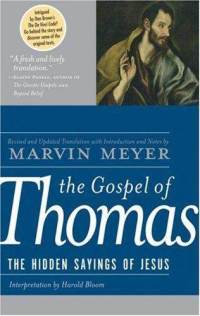
Logion 3: "If we believe in it, we shall live in it for ever.”
3. Jesus said, "If your leaders say to you, 'Look, the kingdom is in heaven,' then the birds of heaven will precede you. If they say to you, 'It is in the sea,' then the fish will precede you. Rather, the kingdom is inside you and it is outside you. "When you know yourselves, then you will be known, and you will understand that you are children of the living father. But if you do not know yourselves, then you dwell in poverty, and you are poverty.”
"If your leaders say to you ...”: This saying parodies announcements that the kingdom is in heaven above or in the underworld...
"In the sea": Papyrus Oxyrhynchus 654.13 provides the variant reading "under the earth.”
"The kingdom is inside you and it is outside you": Compare Luke 17:20- 21: Gospel of Thomas saying 113:4. Similar expressions are known in the Manichaean Psalm Book, particularly 160, 20-21: "Heaven's kingdom, look, it is inside us, look, it is outside us. If we believe in it, we shall live in it for ever.”
"know yourselves": The well-known imperative "Know yourself" was among the Greek inscriptions at the oracular center dedicated to Apollo at Delphi. It is discussed in Plutarch's essay On the E at Delphi and Plato's dialogue Alcibiades I. In Book of Thomas 138, 7-21, Thomas is described as "The one who knows oneself.” In early Christian literature, the formulation "know ... be known" is attested in Galatians 4:8-9; 1 Corinthians 8:1-3; 13:12; the Nag Hammadi Gospel of Truth 19,32-33 ("They knew, they were known").
The Gospel of Thomas: The Hidden Sayings of Jesus
Marvin Meyer, HarperOne; 2nd edition (October 9, 1992) pp. 79-80
(Papyrus Oxyrhynchus 654.9-21)
'Jesus says," [If] your leaders [say to you, 'Look], the kingdom is in heaven,' the birds of [heaven will precede you. If they say] that it is under the earth, the fish of the sea [will enter, and will precede] you. And [God's kingdom] is inside you [and outside (you). 'Whoever] knows [oneself] will find this. [And when you] know yourselves, [you will understand that] you are [children] of the [living] father. [But if] you do [not] know yourselves, [you are] in [poverty], and you are [poverty].”
The Gospel of Thomas: The Hidden Sayings of Jesus
Marvin Meyer, HarperOne; 2nd edition (October 9, 1992) pp. 66-67
Logion 3: "This is the good news! Malkut, the kingdom, is within you and all around you"
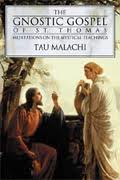
Verse 3
Jesus said, "If those who lead you say to you, 'See, the kingdom is in the sky,' then the birds of the air will precede you. If they say to you, 'It is in the sea,' then the fish will precede you. Rather, the kingdom is inside of you, and it is outside of you. When you come to know yourselves, then you will become known, and you will realize that it is you who are the sons of the living father. But if you will not know yourselves, you dwell in poverty and it is you who are that poverty.”
Malkut, the kingdom of heaven, is within you and all around you-yet, if you do not know that the kingdom is within you, then you will not see the kingdom outside of you. Such is the nature of reality, this magical display of consciousness. The inside and the outside are not separate but are intimately connected. The reality of your experience is the magical display of your own consciousness. A change in consciousness brings about a corresponding change in the reality you encounter. A change in the reality you encounter is an expression of a change in consciousness.
In the world and waking consciousness there are many cocreators of the magical display. There is the individual and the collective creation of this magical display-and the individual, the collective, and the universal consciousness are completely interconnected and interdependent. You alone are not the creator of the reality you experience. Every living being is a unique individual expression of the Life-power, the Holy One of Being, and a co-creator with God of the reality you experience. Nevertheless, when there is a transformation in your own consciousness, there is a proportional and corresponding transformation in the world, in the reality of your experience. In transforming yourself, you transform the world in which you exist. Do you want to change the world? You are the world and the world is you. If you want to change the world, make a change in your own consciousness.
Whether heaven or hell or a world of admixture, it is all a state of mind, a condition of consciousness-being. The kingdom of heaven is not a place, but a spaciousness in consciousness, just as hell is a severe confinement and limitation upon consciousness. There are worlds within worlds and worlds beyond, heavens and hells and spaces in between. All are an expression of consciousness-being, which is the radiant nature of consciousness, and all exist within consciousness.
There are higher, holier worlds than this one. No one can know how many there are. Nor can anyone be certain that any given world or level of consciousness is the same for different persons. Heaven could well be a dread and terrible thing for the wicked person, and for a saint, "hell" could be the most intense joy. What is known is that, most of the time, people are too busy here in this world to notice what is transpiring within it and beyond it, too lost in distraction to know themselves and so realize the wealth of higher and holier worlds that occupy the same space. Most ordinary individuals do not know the creative power that is in them and do not know that they are the world and the world is them. In ignorance, they remain bound to lesser gods and shadow lands, and do not know the world of Supernal Light within and all around them.
So many souls are asleep and dreaming strange and fitful dreams. They are asleep and do not know that they are dreaming and so cannot awaken in the dream to transform it. To the awakened ones, the holy ones, it is a sad and sorry sight. It is a vision of sorrow to behold the nightmares created by self-grasping, desire, and fear, and all of the suffering that naturally follows. The awakened ones know the world of Supernal Light here and now, yet they also know how very real the suffering is of those who remain ignorant and asleep. It is not an issue of personal salvation. No one is perfectly free until everyone is free. "The first shall be last and the last shall be first" (Mark 10:31). Until the last "Wicked" person repents and seeks righteousness, the great transformation of the Second Coming shall not be complete.
The force that binds is the force that will set everyone free. It is the same consciousness-force that manifests as the adversary or the Messiah, as heaven or hell. Enlightenment or unenlightenment are expressions of the very same consciousness-force, the one Life-power.
There is one Divine mind, but two paths. This world stands on the threshold in between. It could go either way at any moment-toward heaven or toward hell-yet salvation is always at hand, the Second Coming ever near, as near as your breath and the beat of your heart, as close as the very nature of your consciousness-being!
Now listen and hear the Word of the Lord. You are free to choose! It could be heaven or it could be hell, but everyone must choose. within you are the powers of salvation and damnation, the Light and the Darkness. When you are at last transparent, there will only be the Light and Life. That is the certainty of salvation in our Lord. Yet the suffering of damnation is all too real until salvation is attained. You must choose each moment. You must know the creative power that is in you and live in remembrance of the Spirit and Truth.
What is to be attained? Knowing and experiencing yourself as part of the Sacred Unity that is God, here and now. You have always been part of that Sacred Unity, are and always will be part of that Sacred Unity, the Holy One of Being. Never have you been separate from the Holy One. Union with God is not really an attainment; it is a present reality and truth. You need only remember the Spirit and Truth. You need only awaken and live with this awareness. It is not something you lack, but who and what you most truly are, the son or daughter of the Living God-the child of the Light, the Light of awareness itself. Who are lost that they should be found? I tell you, none are lost that they should be found. The one who is lost has never existed, and the one to be found was never born. You are what you are seeking, the bornless Spirit.
This is the good news! Malkut, the kingdom, is within you and all around you. Eternal life is the Truth of your inmost being. Death has never existed. You are free!
Tau Malachi, The Gnostic Gospel of St. Thomas
Llewellyn Publications (June 8, 2004) pp. 8-10
His Universe within
"The Upanishads represent the culmination of a process which comes to regard the individual self as having great inner depths, and, indeed, as containing the universe within. The truth (satya) is the absolute (brahman) which is also the self (atman).”- Gavin D. Flood
"The Gospel of Thomas also suggests that Jesus is aware of, and criticizing the views of the Kingdom of God as a time or a place that appear in the other gospels. Here Jesus says," If those who lead you say to you, "look, the Kingdom is in the sky," then the birds will get there first. If they say "It's in the ocean," then the fish will get there first. But the Kingdom of God is within you and outside of you. Once you come to know yourselves, you will become known. And you will know that it is you who are the children of the living father.”
Elaine H. Pagels, PBS and WGBH/FRONTLINE, 1998
Visions Of The Universe: Kazuaki Iwasaki
On August 20, 1995, at the home of Sahaja Yogi, Dattatreya, in Maine, USA, Kash was shown the book Visions of the Universe containing vivid and strikingly realistic paintings of the planets in the universe by Japanese master painter, Kazuaki Iwasaki. (The text is by Isaac Asimov and preface by Carl Sagan.) He was told to look at each page and point out the celestial bodies he had seen in his mystic journeys as he traveled across the universe with Shri Mataji, and reminded to be sure that they matched.
He identified the following planets as he traveled with Shri Visva-Dharini Devi in the universe within the Sahasrara within himself:
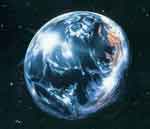
The Earth looks as that on page 17. He is sure as he had seen it from outer space while descending upon it with the Great Adi Shakti on 1994-04-30.
Earth is the third planet in distance outward from the Sun. It is the only planetary body in the solar system that has conditions suitable for life, at least as known to modern science. Gravitational forces have molded the earth, like all celestial bodies, into a spherical shape. However, the earth is not an exact sphere, being slightly flattened at the poles and bulging at the equator. The earth is surrounded by an envelope of gases called the atmosphere, of which the greater part is nitrogen and oxygen. (Columbia Electronic Encyclopedia)...
https://adishakti.org/his_universe_within.htmThe Spiritual Temple of Tomorrow
"Inner human potentials of intuition and creativity have just begun to be rediscovered in all of these areas through the new sciences of consciousness and healing. Earlier in this century, two great prophets of modern times, East and West — one the French Jesuit anthropologist and theologian Pierre Teilhard de Chardinand and the other the Hindu sage Sri Aurobindo of Pondicherry, India — proclaimed that the next step in human evolution would be “A psychic-spiritual mutation" to a higher consciousness.
The mythic foundations of the old world order — and its rationalistic, reductionalistic, materialistic, Newtonian presuppositions which have dehumanized Western civilization and created a stripped, mechanistic model of the human being and of human societies — are no longer credible to those who know enough. But it is also obvious that not everyone in positions of power in church, state, or academia seems to understand yet the new models of future science and the new sciences of consciousness and healing, or their significance for approaching forms of planetary existence that will profoundly change and affect our daily lives in the twenty-first century...
In the social sciences of the near future, positive forms of primary human spiritual and psychic experiences will be recognized as the sources of classic myths and religious doctrines. Scholars will understand more about the transformative powers of the psyche and spirit; immortality; life after life; communication with dead saints, sages, and ancestors; extraordinary healings; and belief in "other" or "higher worlds" and a multidimensional universe. These experiences will be acknowledged one day in secular societies — not as mere superstitions from a prescientific age — but rather as universal factors in the formation of tremendously empowering, symbolically expressed creeds found in all cultures, ancient and modern. We will then perhaps at last be able to see our way past the present radical opposition between science and spirituality. We might also begin to lessen the misunderstandings between conflicting faiths that have been so destructive in human affairs over the past several centuries and millennia.
Are there really universal human values waiting to be discovered within the world's religions and cultures, across all sectarian boundaries? Yes! But these cannot be discovered by a rationalistic, left-brained academic analysis alone. The consciousness of scholars themselves will have to change and their perspectives expand to the consideration of alternative new paradigms for the convergence of science and spirituality in the global village. And more important even than this, we must begin to pay attention to the qualities of personal transformation in the creation of a new humanity.
The fruits of the spirit — under whatever terminology — have always been recognizable and are treasured by mystics who are frequently a force for positive social reform in most of the world's great religions and cultures, East and West. These universally recognized qualities of authentic spiritual life in all of the great religious traditions of the world include unselfish love, the readiness to forgive injuries, peace, justice, compassion, humility, and the joyous service of a global humanity, of all sentient life, and of the planet itself. And it is classical mystical experience — in many of its varied religious and secular forms — that has in fact inspired and nurtured the perennial heroic and prophetic quest for peace, justice, and a better world.”.. on Earth, as it is in Heaven.” "
John Rossner, The Spiritual Temple of Tomorrow
(John Rossner, Ph.D., D.Sc., D.Litt., is professor of religion at Concordia University, Montreal, Canada. He is president of The International Institute of Integral Human Sciences and abbot-general of The Order of the Transfiguration. Source: Georg and Trisha Lamb Feuerstein, Voices on the Threshold of Tomorrow, The Theosophical Publishing House, Quest Books, 1993, p. 6-8.)
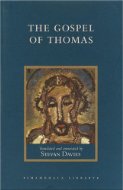
Logion 3: "The idea that self-knowledge is a road to salvation is perhaps as old as philosophy itself.”
3a Jesus said: If your leaders say to you "Look! The Kingdom is in the sky!" then the birds will be there before you are. If they say that the Kingdom is in the sea, then the fish will be there before you are. Rather, the Kingdom is within you and it is outside of you. [4]
3b When you understand yourselves you will be understood. And you will realize that you are Sons of the living Father. If you do not know yourselves, then you exist in poverty and you are that poverty. [5]
[4] Having introduced the principle that the Kingdom is to be sought and found, the Gospel of Thomas parodies two ideas attributed to rival leaders. The Kingdom is not to be found across the sea, and it is not up in the sky. Even today, many people will point to the sky if asked where heaven is to be found. But this saying makes fun of such an idea. The Kingdom is within you, as Luke's Gospel also says (17:20-21). And yet it is also outside. Thomas is a spiritual Gospel, yet it points out to the world of nature and to the realm of all creation instead of pointing back only toward the reader.
[5] The idea that self-knowledge is a road to salvation is perhaps as old as philosophy itself. Its most famous occurrence is the inscription "Know Thyself" at the oracle at Delphi. Thomas's statement "The Kingdom is within you and outside of you" places that Gospel in the context of ancient philosophical speculation and affirms the goodness of both human nature and of the nature of the outside world in an unambiguous fashion. Being Sons of the Father is to be like Jesus himself, a status one does not attain anew but that one realizes one has always had. Accordingly, self-discovery is the key to finding the potential wealth buried in people and in the world.
Stevan Davies & Andrew Harvey, Gospel of Thomas Annotated and Explained
Reviews, Skylights Path (2006) pp. 4-5
Logion 3: "In contrast to such misguided leadership, Jesus directs the readers to understand their own empowerment.”
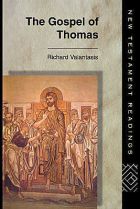
Saying 3 Jesus said," If your leaders say to you, 'Look, the
Scholars have read this saying in a number of ways, as a "popular Jewish motif of seeking after wisdom in the furthest reaches of the universe" (Patterson 1993: 72), or as a midrash on Deuteronomy 30:10- 15 which establishes a connection between the commandments, wisdom, and the interior status of the reign of God (Glasson 1976-77: 151-52 and Davies 1983: 41-46). All of these interpretations overlook the subject of the saying: "those who lead you.” This saying problematizes leadership. Readers experience for the first time the irony and sarcasm possible in these collections of sayings. The narrative strategy has already invested the reader with a kind of full authority to find the community's interpretation of the sayings, a process hat has guaranteed immortality. When we first hear about "leaders," they are giving bad information, directing the seekers' attention to the sky or under the earth. To follow such leaders results in getting lost. In contrast to such misguided leadership, Jesus directs the readers to understand their own empowerment: the imperial rule of God is found both within and without the seeker. True leadership directs the seeker inward to a new understanding of the self, and outward to a new understanding of the world in which God's imperial rule is manifested. The seeker guides the self into knowledge, requiring no external guidance other than the saying of Jesus that directs the seekers to themselves.
The important point is not only that there is a new understanding of an empowered self, but also that God's imperial rule must be understood anew. The location of God's imperial rule is not in the heavens, nor is it under the earth (other creatures would experience the rule of God first, if this were the case), but God's imperial rule is within and without the person. The interior location of the imperial rule, as Patterson (1993:71-72) argues, finds specific thematic parallels with Luke 17.20-21 ("for behold, the kingdom of God is in the midst of you") and perhaps with Matthew's "Warning against those who would locate the kingdom in a specific place" (Matthew 24.26). The Kingdom of God in this saying, however, remains interior in that it emerges from self-knowledge and exterior in that it depends upon a self-awareness that leads to a new understanding of the mundane world.
This relocation of the imperial rule of God probably represents one side of an ongoing conversation among early Christian people about authority and power: some probably expected an apocalyptic rule of God inaugurated from the heavens (as Paul did in 1 Thessalonians), others may have experienced the church community itself as the inauguration of the reign of God (as Matthew did in his gospel), still others at once interiorized the rule of God and, therefore, reinterpreted its external significance (as in this saying).
This new awareness and understanding of the self develops from the kind of seeking mentioned in the previous saying. The readers, and the seekers, will find this understanding of the rule of God as they come to know themselves. Self-knowledge reveals the connection to the Father, not as an external adoption by a distant heavenly Father, but as "children of the living Father," a Father who is present and vital. The opposite of this self-knowledge is poverty: true wealth does not consist in anything but knowing self, poverty both as a state of being and as a condition of life follows from the refusal to seek.
All of these issues are intimately connected. The true self, the empowering strategy both of the narrator and of Jesus' sayings, the alternative understanding of the world, the redefinition of poverty both as ontological and social, the rejection of hierarchical leadership—all these conspire to create alternative understandings of self, relationships, and world. These alternatives work ascetically; they are a part of a systematic means of redefining and reorienting the seeker to the world (see Valantasis 1995b). They open the possibility of transformation and renewal through the interpretative practices outlined in the sayings.
Richard Valantasis, The Gospel of Thomas
Routledge; 1 edition (June 27, 1997) pp. 58-9
P. Oxy 654.27-31 [Coptic Saying 3]
Jesus says," [If] your leaders [say to you, 'Look,] the
The community these sayings posit experiences itself as fully empowered: its members do not need guidance. In fact, as this saying indicates, leaders often point seekers in the wrong direction, leading them to the heavens or the seas where nothing significant happens, and where other creatures more logically would function. So this saying encourages the seekers to ignore outside leadership and follow themselves into a kind of self-knowledge that reveals their adoption
For these seekers, self-direction marks true guidance: that which most leaders find only in objectification and exteriorization, the true seeker finds both within the self and outside the self. The interiority of the discovery of the rule of God correlates (and presumably precedes) any exterior experience of it. The desired reign of God cannot be located only outwardly (in the sky or under the earth), but also inwardly. Nothing circumscribes the rule of God or objectifies it: it is both within and without the person.
The statement about the interiority and exteriority of the rule of God leads to the development of a contrast based upon self-knowledge. The interior and exterior reality of the rule will be found by those who know themselves. The finding now becomes identified with self-knowledge, and that self-knowledge results in the self-understanding of the seeker as “A child of the living Father.” The adoption by God emerges from a process of discovery of the self and its relationship with the rule of God. This beneficent situation contrasts markedly with its alternative. For those who do not know themselves, who have not discovered their true selves in relationship to the rule of God, they "live in poverty," and in fact become that poverty. The process of self-discovery, that is, does not remain neutral so that one gains an increment of knowledge or understanding which adorns an otherwise rich life. Rather, the knowledge itself becomes the wealth and its lack becomes poverty. The personal stakes for the seeker revolve about either a wealth or a poverty, becoming rich or poor. The starkly drawn contrast again provides a window into the emotional and psychological dynamic of those who read and interpret these sayings.
Richard Valantasis, The Gospel of Thomas
Routledge; 1 edition (June 27, 1997) pp. 33
Logion 3: "The community these sayings posit experiences itself as fully empowered: its members do not need guidance.”
P. Oxy 654.9-21 [Coptic Saying 3]
Jesus says," [If] your leaders [say to you, 'Look,] the
The community these sayings posit experiences itself as fully empowered: its members do not need guidance. In fact, as this saying indicates, leaders often point seekers in the wrong direction, leading them to the heavens or the seas where nothing significant happens, and where other creatures more logically would function. So this saying encourages the seekers to ignore outside leadership and follow themselves into a kind of self-knowledge that reveals their adoption by God. For these seekers, self-direction marks true guidance: that which most leaders find only in objectification and exteriorization, the true seeker finds both within the self and outside the self. The interiority of the discovery of the rule of God correlates (and presumably precedes) and exterior experience of it. The desired reign of God cannot be located only outwardly (in the sky or under the earth), but also inwardly. Nothing circumscribes the rule of God or objectifies it: it is both within and without the person.
The statement about the interiority and exteriority of the rule of God leads to the development of a contrast based upon self-knowledge. The interior and exterior reality of the rule will be found by those who know themselves. The finding now becomes identified with self- knowledge, and that self-knowledge results in the self-understanding of the seeker as “A child of the living Father.” The adoption by God emerges from a process of discovery of the self and its relationship with the rule of God. This beneficent situation contrasts markedly with its alternative. For those who do not know themselves, who have not discovered their true selves in relationship to the rule of God, they "live in poverty," and in fact become that poverty. The process of self-discovery, that is, does not remain neutral so that one gains an increment of knowledge or understanding which adorns an otherwise rich life. Rather, the knowledge itself becomes the wealth and its lack becomes poverty. The personal stakes for the seeker revolve about either a wealth or a poverty, becoming rich or poor. The starkly drawn contrast again provides a window into the emotional and psychological dynamic of those who read and interpret these sayings.
Richard Valantasis, The Gospel of Thomas
Routledge; 1 edition (June 27, 1997) pp. 33-4
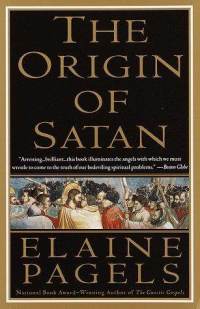
Logion 3: "One enters that kingdom when one attains self-knowledge"
"Why was this gospel suppressed, along with many others that have
remained virtually unknown for nearly two thousand years? Originally
part of the sacred library of the oldest monastery in Egypt, these
books were buried, apparently, around 370 C.E., after the archbishop
of Alexandria ordered Christians all over Egypt to ban such books as
heresy and demanded their destruction. Two hundred years earlier,
such works had already been attacked by another zealously orthodox
bishop, Irenaeus of Lyons. Irenaeus was the first, so far as we know,
to identify the four gospels of the New Testament as canonical, and
to exclude all the rest. Distressed that dozens of gospels were
circulating among Christians throughout the world, including his own
Greek-speaking immigrant congregation in Gaul, Irenaeus denounced as
heretics those who 'boast that they have more gospels than there
really are ... but really, they have no gospels that are not full of
blasphemy.' Only the four gospels of the New Testament, Irenaeus
insisted, are authentic. What was his reasoning? Irenaeus declared
that just as there are only four principal winds, and four corners of
the universe, and four pillars holding up the sky, so there can be
only four gospels. Besides, he added, only the New Testament gospels
were written by Jesus own disciples (Matthew and John), or their
followers (Mark, disciple of Peter, and Luke, disciple of Paul).
Few New Testament scholars today agree with Irenaeus. Although the
gospels of the New Testament—like those discovered at Nag Hammadi—are
attributed to Jesus' followers, no one knows who actually wrote any
of them; furthermore, what we know about their dating makes the
traditional assumptions, in all cases, extremely unlikely. Yet
Irenaeus's statements remind us that the collection of books we call
the New Testament was formed as late as 180-200 C.E. Before that
time, many gospels circulated throughout the Christian communities
scattered from Asia Minor to Greece, Rome, Gaul, Spain, and Africa.
Yet by the late second century, bishops of the church who called
themselves orthodox rejected all but the four canonical gospels,
denouncing all the rest, in Irenaeus's words, as 'an abyss of
madness, and blasphemy against Christ.' Irenaeus wanted to
consolidate Christian groups threatened by persecution throughout the
world. The gospels he endorsed helped institutionalize the Christian
movement. Those he denounced as heresy did not serve the purpose of
institutionalization. Some, on the contrary, urged people to seek
direct access to God, unmediated by church or clergy.
The Gospel of Thomas, as noted above, claims to offer secret teaching—
teaching quite different from that of Mark, Matthew, Luke, and John.
According to Mark, for example, Jesus first appears proclaiming
that 'the time is at hand; the Kingdom of God is drawing near.
Repent, and believe in the gospel' (1:15). According to Mark, the
world is about to undergo cataclysmic transformation: Jesus predicts
strife, war, conflict, and suffering, followed by a world-shattering
event—the coming of the Kingdom of God (13:1-37).
But in the Gospel of Thomas the 'kingdom of God' is not an event
expected to happen in history, nor is it a 'place.' The author of
Thomas seems to ridicule such views:
Jesus said, 'If those who lead you say to you, 'Lord, the kingdom is
in the sky,' then the birds of the sky will precede you. If they say
to you, 'It is in the sea,' then the fish will precede you' (NCH
II.32.19-24).
Here the kingdom represents a state of self-discovery:
'Rather, the kingdom is inside of you, and it is outside of you. When
you come to know yourself, then you will become known, and you will
realize that it is you who are the sons of the living Father' (NHC
II.32.25-33.5)
But the disciples, mistaking that kingdom for a future event, persist
in naive questioning:
'When will...the new world come?' Jesus said to them, 'What you look
forward to has already come, but you do not recognize it' (NHC II.42-
10-12)
According to the Gospel of Thomas, then, the kingdom of God
symbolizes a state of transformed consciousness. One enters that
kingdom when one attains self-knowledge. The Gospel of Thomas teaches
that when one comes to know oneself, at the deepest level, one
simultaneously comes to know God as the source of one's being.”
Elaine Pagels, The Origin of Satan: How Christians Demonized Jews
Pagans, and Heretics, Vintage (1965) 69-71

"This supreme self cannot be realised, O Rama, by means other than wisdom - not indeed by exerting oneself in religious practices.”
RAMA: O Holy sage! Pray, tell me what the mind really is.
VASISTHA: Even as empty, inert nothingness is known as space, mind is empty nothingness. Whether the mind is real or unreal, it is that which is apprehended in objects of perception.
Rama, thought is mind, there is no distinction between the two. The self that is clothed in the spiritual body is known as mind; it is that which brings the material or physical body into existence. Ignorance, samsara (repetitive history), mind-stuff, bondage, impurity, darkness and inertia are all synonyms. Experience alone is the mind; it is none other than the perceived.
This entire universe is forever non-different from the consciousness that dwells in every atom, even as an ornament is non-different from gold. Just as an ornament potentially exists in gold, the object exists in the subject. But when this notion of the object is firmly rejected and removed from the subject, then consciousness alone exists without even an apparent or potential objectivity. When this is realised, evils like attraction and repulsion, love and hate, cease in one's heart, as also the false notions of the world, you, I, etc. Even the tendency to objectify ceases; this is freedom.
RAMA: Holy sir, if the object of perception is real, then it shall not cease to be. If it is unreal, then we do not see it as unreal; so how can we overcome this?
VASISTHA: Yet, O Rama, we see that there are holy ones who have overcome this! External objects like space,etc., and psychological factors like "I" etc., exist only in name. In reality neither the objective universe, nor the perceiving self, nor perception as such, nor void, nor inertness exists; only one is, cosmic consciousness (cit). In this it is the mind that conjures up the diversity, diverse actions and experiences, the notion of bondage and the desire for liberation.
RAMA: O Holy sage! What is the source of this mind and how did it arise? Kindly enlighten me on these.
VASISTHA: After the cosmic dissolution and before the next epoch dawned, the entire objective universe was in a state of perfect equilibrium. There then existed the supreme Lord, the eternal, unborn, self-effulgent, who is the all and who is omnipotent. He is beyond conception and description; though he is known by various names like Atma etc., these are viewpoints and not the truth. He is, yet he is not realised by the world; he is within the body, too, yet he is far. From him emerge countless divinities like lord Visnu, even as countless rays emerge from the sun; from him emerge infinite worlds as ripples arise from the surface of the ocean.
He is the cosmic intelligence into which countless objects of perception enter. He is the light in which the self and the world shine. He ordains the characteristic nature of every created thing. In him the worlds appear and disappear, even as a mirage appears and disappears repeatedly. His form (the world) vanishes, but his self is unchanging. He dwells in all. He is hidden and he overflows. By his mere presence, this apparently inert material world and its inhabitants are ever active. Because of his omnipresent omnipotent omniscience, his very thoughts materialise.
This supreme self cannot be realised, O Rama, by means other than wisdom— not indeed by exerting oneself in religious practices. This self is neither far nor near; it is not inaccessible nor is it in distant places: it is what in oneself appears to be the experience of bliss, and is therefore realised in oneself.
Austerity or penance, charity and the observances of religious vows do not lead to the realisation of the Lord; only the company of holy men and the study of true scriptures are helpful, as they dispel ignorance and delusion. [Only] when one is convinced that this self alone is real, one goes beyond sorrow, on the path of liberation.
Austerity or penance is self-inflicted pain. Of what value is charity performed with wealth earned by deceiving others — only they derive the fruits of such charity! Religious observances add to one's vanity. There is only one remedy for ignorance of the Lord — the firm and decisive renunciation of craving for sense-pleasure.
Swami Venkatesananda, The Concise Yoga Vasistha
State University of New York Press (October 1984), pp. 41-43
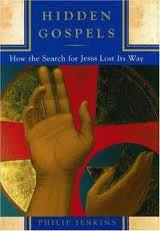
"While the newly found document have enriched our understanding of the early Christian movement, many scholars also believed that they have revolutionaized the study of the world of Jesus himself. The pioneering Quest of the Historical Jesus followed the emergence of critical historical methods in the nineteenth century which was described in a classical book by Albert Schweitzer. The second quest followed in the 1960s and 1970's, and was swiftly followed by a distinct 'third quest' in the 1980s and 1990s. (...) In large measure, this latest quest is distinguished from its predecessors by the discovery of new sources of information, above all, the hidden gospels. According to some scholars, we finally have access to documents and other resources which have been unavailable since not long after the time of the apostles: only at the end of the twentieth century did it become possible to gain an understanding of Jesus and his age infinitely superior to that of the past sixty or seventy benighted generations. To quote Stevan L. Davies, 'For nineteen hundred years or so the canonical texts of the New Testament were the sole source of historically reliable knowledge concerning Jesus of Nazareth. In 1945, this circumstance changed' (the reference s to the finding of the complete text of Thomas).
Much of the attention received by the hidden gospels reflects the advocacy of the Jesus Seminar. Fundamental to the Seminar's approach is what the group's founder Robert Funk has called 'the end of canonical imperialism,' the determination not to be constrained by only those sources approved by imperial and ecclesiastical authorities over the centuries. In 1993, the Seminar group published their new edition of The Five Gospels, in which they state that 'foremost among reasons for a new translation is the discovery of the Gospel of Thomas.' Throughout the writings of Seminar Fellows, Thomas is used as a yardstick to assess the accuracy of words attributed to Jesus. Seminar members have also been diligently engaged in publishing other suppressed texts, and have presented a major collection which boasts the title The Complete Gospels. This volume 'presents for the first time anywhere all twenty of the known gospels from the early Christian era.... Each of these gospel records offers fresh glimpses into the world of Jesus and his followers.' This effort is advertised as an attempt to restore the suppressed scriptures to the lay public, much as Luther and the early Protestant reformers gave the people the Bible in their own vernacular tongue.
If we can believe some claims about the hidden gospels, then this historical Jesus was utterly different from what most of us would have imagined until very recently. According to readings of Thomas and its like, the earliest Jesus Way was nothing like the religious system which it ultimately became, the world of Christianity. Instead of focusing on concepts such as sin and judgment, redemption and otherworldly salvation, early Jesus followers were seeks after mystical illumination, of heavenly Wisdom. Neither hierarchical nor liturgical, the movement was individualistic, egalitarian, and intoxicatingly diverse. Based on Thomas, it is claimed that Jesus' 'message is strongly counter-cultural: he shuns materialism and directs the reader towards the simple life, a spiritual existence.... Jesus here is not a messiah but a social radical, telling listeners to reject society's phony piety and the hallow values of the business world.' This Jesus teaches that the kingdom of God is present and attainable here and now, within each follower: he mocks concepts of eschatology, any hopes or fears about the end of the world. The rejection of the apocalyptic Jesus is probably the greatest single insight derived from the hidden gospels, and presented as unshakable fact, the idea pervades contemporary critical New Testament scholarship. For the radical scholars at least, the change of attitude toward the nature of Jesus' core message represents a full-scale paradigm shift. Early Jesus followers were not even 'Christians,' as that term implies a belief in the concept of the messiah (christos , or anointed one), with all its theological baggage. Jesus was neither Christ, nor a Christian.
Though the controversial 'Quest for Jesus' has been widely publicized, no less significant for contemporary Christians is the equally subversive Quest for the Earliest Church, a search which depends entirely on insights from the hidden gospels. In rediscovering the real Jesus, scholars ask how the subversive inner kingdom which he preached gave way to the all too worldly power of the institutionalized churches. In this process, it is claimed, Jesus' principles of love and individual self-discovery were transformed by ideas of law and patriarchy: a popular spiritual movement became an authoritarian empire: democracy gave way to hierarchy, spontaneity to ritualism, gender equality to misogyny.”
Philip Jenkins, Hidden Gospels: How the Search for Jesus Lost Its Way
Oxford University Press (Feb 18 2003) pp. 8-10
"The preachings of religion make a person dependent on priests, temples, idols, blind faith, and dogma"
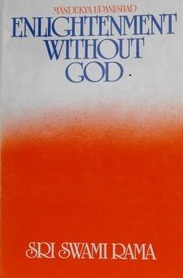
"The Upanishadic literature is not a religious scripture and is free from dogma and doctrines. It is not a part of any religion but is a philosophy for all times and for all. This philosophy does not oppose any school of thought, religion, or interpretation of the scriptures, but its methods for explaining its concepts are unique. The Upanishads should not be confused with the religious books of the East; there is a vast difference between the philosophy of the Upanishads and the preachings of any of the religious scriptures of the world. In religion and religious books, there is little practicality and much theory. One is not supposed to interpret religious sayings, for there is always the possibility of distortion. For this reason, their explanation is delegated to a few teachers and preachers who are considered to be the custodians and authorities on these scriptures. Common people do not have the opportunity to study the scriptures in depth, but instead must rely on the interpretations of such preachers who may show no signs of enlightenment and yet have influence over the conscience of the masses. Whether these clerics actually know and practice religious truths or not is never questioned, and those who do question are considered to be atheists and heretics. Intellectual bankruptcy such as this leads the masses to blind faith and causes many wars and divisions in the human race. For the younger generation today, however, empty religious preachings are not fulfilling, for the modern mind likes to use reason and logic before it accepts anything as truth.
With the development of science and technology, there has arisen a provocative mind that questions the existing religions and their role in society. The modern mind has started questioning, but the search for truth still remains obscured because scientific explorations are directed externally and not toward the inner levels of life. Science and technology are materially oriented, but a human being is not matter or energy alone. Most human resources are currently being directed to matter, mind, and energy, but little effort is being made toward the expansion and exploration of human consciousness. Modern psychologists are scratching the surface of mental life in order to eliminate superficial human problems in the external world, but the vital questions of life are not yet resolved, for they are beyond the grasp of materially-oriented thinking.
The Upanishads prepare, inspire, and lead the student to know and realize the Ultimate Truth. First of all, the philosophy of the Upanishads frees one to cast away his intellectual slavery to blind faith, superstitions, sectarian beliefs, and dogmas. Then it helps one to expand his individual consciousness to Universal Consciousness; thus one's personality is transformed, and one becomes a universal being. An individual is essentially Brahman, or identical to Universal Consciousness, and direct realization of that truth is called enlightenment. Current religious preachings, on the other hand, are enveloped in a thick layer of dust, and they need a complete shakeup. Religion needs modification to suit the needs of modern man. There seem to be two options for humanity: either it stops listening to the preachings, starts seeking the truth, and rejoices in the broader awareness of truthful living; or it continues to follow religious dogma, fails to attain the next step of civilization, and remains in ignorance and suffering. Upon careful analysis of the living and thinking structure of modern human society, anyone can see that the process of human evolution is in a state of stagnation. All current research is directed to the external world; thus the human goal has become materially oriented and superficial. Human beings today have nothing better to live for than acquiring many comforts. These may be necessities and means, but because attaining them lacks a goal or aim, they create a hollow and empty philosophy that brings only strain and stress.
The preachings of religion make a person dependent on priests, temples, idols, blind faith, and dogma, and dependence is a habit of the lower mind. Such crutches may be useful at a certain stage for some people, but they do not lead one to Ultimate Truth. A dependent mind is not free, and without freedom, enlightenment is impossible. Religious dogmas are full of beliefs and myths that do not satisfy the human intellect and that bind believers to a narrow view of life and human potential. Such preachings instill more fear than love in the hearts of the masses. Religion either promises salvation or threatens the tortures of hell, but it does not provide sound solutions to the hellish problems and situations that plague human beings here and now. Nor does it satisfactorily explain life before birth or after death. One of the main themes of Upanishadic philosophy, however, is to attain a state of fearlessness, cheerfulness, and self-confidence. In addition, the Upanishads lead the student to know life in its totality. Knowledge of life before birth, knowledge of now, and knowledge of life hereafter can be realized through the methods given in the Upanishads. The Upanishads provide systematic methods for self-training, self-transformation, and self-enlightenment. They lead aspirants 'from the unreal to the Real, from darkness to Light, and from mortality to Immortality.'
The founders of religion were selfless and sincere—great seers, sages, and spiritual leaders. But as religions grew, the teachings of the founders were lost, and only the preachings of their selfish followers remained. Because of this, the great religion of the East was reduced to the narrow faith and beliefs of Hinduism, Brahmanism, Buddhism, and Jainism. Practical Christianity also disappeared forever, and there remained only churchianity. History shows that religionists do not actually encourage one to follow in the footsteps of the founder of their religion by practicing his teachings, but, rather, they instruct their followers to worship the image or the name of the founder of the religion through priests. Many religious leaders who claim to know God are more miserable than those they attempt to lead; they suffer from trite egoism, jealousy, and selfishness. The light of truth cannot shine through such barriers. Thus, the blind are leading the blind. The philosophy of the Upanishads is not bound by a single founder or religion, however, and it is as applicable today as it was thousands of years ago, and it will be so for as long as humanity exists.
Religious dogma sets forth rigid commandments presented in terms of good and bad, black and white, with no explanations to support them. In the long run, these create serious overreactions and overcompensations in the human mind. All the books from the different religions repeat set laws of conduct in the same way, yet each of these religions claims that it is superior to all the others. Religious beliefs may offer solace to lower, primitive, less educated, and uncultivated minds, but they have nothing to offer those who already know what to do and what not to do, and who are seeking logical solutions to life's questions and guidance in learning how to be. In today's so-called civilized I society, the moral laws preached by the leaders and preachers seem to be incomplete. Such teachings and preachings are, therefore, misleading and are a mere waste of time and energy. As long as the preachers, police, and army have to guard the morality of human beings, this cannot be considered to be a civilized society. The moral custodians of today's world are actually atomic weapons, not the laws given in the religious books of the world. Thus, material forces are guiding the destiny of human life. Human beings have lost their center of equilibrium and live without any sense of equality, love, and mutual understanding. Religions do not teach unity but create divisions in human society. The Upanishads do not impose commandments, but, rather, offer practical guidelines and methods for self-discipline and self-unfoldment. The steps for inner growth contained in the Upanishads can be incorporated into one's individual lifestyle and can help one examine the accomplishments of one's spiritual practice (sadhana).
Religions can be divided into two groups. One group follows the prophets but does not believe in inner experience. These religions are actually cults and are full of rituals, fear, guilt, and fanaticism. The other group of religions has a vast spiritual literature, but the followers are exploited by priests who involve them in rituals without explaining their purpose or establishing their validity. Therefore, both types of religion have been exploiting humanity and, thus, crippling human efforts to evolve and attain the next step of civilization in which people will learn to live with others in mutual understanding and love. The vast majority of the human population practices religious rituals in some way or other, but no ritual exists that can eliminate the ignorance that causes pain and misery.
Religions have two great weapons to conquer the hearts of their followers: faith and grace. The way faith is described in religious scriptures is not actually faith at all, but is blind belief based on ignorance and rigidity of tradition. Tradition and truth are entirely different. One is mingled with customs, systems, cultures, habits, thoughts, feelings, and desires, and the latter is a search for the Ultimate Reality. For attaining truth, everything the aspirant has, including thoughts, deeds, and speech, becomes a means for attaining truth; while in tradition, all means are used for the sake of convenience, pleasure, and gratification. Religionists and their faithful followers are afraid to analyze the very nature of their faith. Thus, one is lost in a morass of religious fanaticism. Faith that does not recognize the faculty of reasoning and that has not been filtered by reasoning is based on blind beliefs that remain unexamined. They thus unnecessarily create doubts, and when doubts are not resolved, such faith disappears. Blind faith, being empty and devoid of any real reason or fact, is often found wanting when one has a problem and expects to find a strong basis that will support and carry him through difficult times. Then one finds, instead, nothing to hold on to or anchor oneself to. Because of this weakness in religious faith, religious dogma says that faith is a gift from God, and that if one questions it, then it might vanish and be lost. True faith is supported by pure reason, which is attained through thoughtful analysis of life. Following the extended practice of sadhana; and purification, a few fortunate seekers realize and know the nature of the world as it is and also experience the all-pervading truth that enlightens the' dark chamber of the aspirant's heart.
The Upanishads say that to rise above and reach a state beyond and to know the real nature of the transitory world, one must cultivate logic and pure reason and make sincere efforts with the help of deep contemplation. They declare, 'Only that which is good and auspicious in Upanishadic literature should be revered and brought into practice, and the rest should be left behind for further introspection.'
In religions, grace is considered to be a gift bestowed on the seeker, either as a reward for following the commandments or by mere whim. Thus, the bestowing of blessings serves as a bribe to make one conform, and it implies that the seeker is helpless to succeed by his own effort. There is often little sense of individual mastery but rather a reliance on the favors of fate or the judgments of the preachers. Fear and insecurity are the logical results.
Today religion has degenerated so much that it has become totally materialistic. No matter how good a heart one has, if one is not on the list of followers and supporters of the church, then one's faith does not have any value in the eyes of religionists. Religious leaders and preachers who claim to be custodians of faith and grace sell faith to blind followers for wealth and favors, and, thus, religious materialism takes the place of spiritual sincerity.
Various schools of theology argue over the semantics and meaning of the verses and parables of religious scriptures and never reach any shared interpretation. In order to confront the question of life, one must remain unaffected by religious dogma, doctrines, and superstition, and one must make use of one's finest instrument, the intellect. The Upanishads do not encourage students to depend on the sayings of the scriptures; rather they inspire them to be self-reliant and discriminating. Religious dogma encourages people to follow the canons of a particular sectarian belief that is limited to a specific group. Thus, instead of expanding universal brotherhood, it further divides humanity and pollutes human feelings with biases and prejudice. Upanishadic philosophy is the expression of supreme knowledge directly experienced by great sages and is not confined to caste, color, society, or nation.
Today the world lives under the law of fear, trembling with doubts and uncertainty. No prophet of the law of love is to be found, and one finds no leaders who give object lessons, sympathy, and good will, and who identify with the true happiness of individuals and nations and the highest good of mankind. Many religious leaders exist, but it is amazing to note how tired and confused they are. 'Rise, awake, and gain knowledge'—this Upanishad declares that one should not act like a gigantic inert person who is dumb and desolate, who knows not the meaning of life and the universe. All human beings have the essential potentialities to understand and direct their life streams toward the ocean of bliss. The message of Upanishadic philosophy extends good will to the whole of humanity, saying, 'Let all of mankind be happy; let all of humanity attain physical, mental, and spiritual health; let all receive and enjoy auspiciousness; let no one experience pain and misery here and hereafter.”
Swami Raja, Enlightenment Without God
Himalayan Inst Pr (June 1982) pp. 11-18
Logion 3: “You have to enter into the Kingdom of God here, as I say, in the Seventh Chakra"

“The Comforter will be an incarnation of the Holy Spirit as Jesus was of the Spirit of Christ. As Cosmic Mother She holds a superior position, far beyond the conception of a finite mind, and it will no more be possible for us to understand Her character and functions than if She represented the Creator Himself. It is on that account that Jesus said that the Comforter, when She comes, would not speak of Herself.” (Brandt 1936, 36)
“You have to take a stand in your family, in your surroundings, with your friends, and you have to tell them, "You better all get realized.” The reason for that is that the Christ who crucified Himself is going to come back with His Eleven Forces of Destruction. And when He starts He is not going to ask you to take any Realization. No one is going to be bothered whether you are going to hell. He will just sort out. But those who have got Realization will enter into the Kingdom of God. You have to enter into the Kingdom of God here, as I say, in the Seventh Chakra.”
THE MOTHER: Messiah-Paraclete-Ruh
The New Age Has Started, Houston, USA—Oct. 6, 1981
“As soon as the Sahasrara was opened the whole atmosphere was filled with tremendous Chaitanya. And there was tremendous light in the sky. And the whole thing came on the Earth — as if a torrential rain or a waterfall — with such tremendous force, as if I was unaware and got stupefied. The happening was so tremendous and so unexpected that I was stunned and totally silent at the grandeur.
I saw the Primordial Kundalini rising like a big furnace, and the furnace was very silent but a burning appearance it had, as if you heat up metal, and it had many colors. In the same way, the Kundalini showed up as a furnace, like a tunnel, as you see these plants you have here for coal burning that create electricity. And it stretched like a telescope and came out one after another, Shoo! Shoo! Shoo! Just like that.
And the Deities came and sat on their seats, golden seats, and then they lifted the whole of the head like a big dome and opened it, and then this torrential rain complete drenched Me. I started seeing all that and got lost in the Joy. It was like an artist seeing his own creation, and I felt the Joy of great fulfillment.
After coming out of this beautiful experience I looked around and saw human beings so blind and I became absolutely silent, and desired that I should get the cups to fill the Nectar.”
THE MOTHER: Messiah-Paraclete-Ruh
Paris, France—May 5, 1982

The Paraclete Shri Mataji, Press Conference, London, UK—July 8, 1999
“Today we are celebrating the opening of the Sahasrara. On this day I must say it was a Great Happening that took place on all the humanity. It was such an achievement, which I never realized before. Now I can see that without Self-Realization it would have been impossible to talk to people.
Then this happened! I thought that how I will talk to people about it because no one would understand Me and it would be a big mistake on My part to say something about Sahasrara because even about Sahasrara nowhere in the scriptures something was described. It was absolutely an ambiguous description I would say where people could not even have thought there is a realm beyond Sahasrara, and one has to enter that realm where is the Reality.
That time what I saw around Me was darkness and unless and until there are many Lights, people will never realize that how important it is to have Light.”
THE MOTHER: Messiah-Paraclete-Ruh
Adi Shakti Puja, Cabella, Italy—June 9, 1996
“Today is a great day for us, for all the Sahaja Yogis that on this day ... the Sahasrara was opened out. It was just a miracle I should say because I didn't think that I am at a point where it could be done. So I wanted to wait but some things happened that made Me think that it had to be opened. It was in such a situation that I felt if I delayed it anymore now it may help these false gurus to spread their nonsense all over.”
THE MOTHER: Messiah-Paraclete-Ruh
To Achieve Complete Freedom, Sahasrara Puja, Cabella, Italy—May 7, 1995
“For all of us the seekers the last work of the Divine of opening the last centre in the Great Primordial Being was done on the 5th of May, 1970. It is the greatest event of all the spiritual happenings of the Universe. It was done with great care and great attachment. It is not in the limits of human understanding how things are worked in the heavens. It is your fortune and God's Love that has worked this one.
Without this happening there could not have been a possibility to give mass Realization to people. One could have done it on one or two persons here and there, but to give such a mass awakening could not have been possible.”
THE MOTHER: Messiah-Paraclete-Ruh
Opening Of The Primordial Sahasrara
Sahasrara Puja, Paris, France—May 5, 1982

“The portrait of the Paraclete in the Johannine gospel bears a striking resemblance to Jesus. Virtually every quality ascribed to the Paraclete has a parallel in what was said of Jesus. Jesus himself says that the Father will send another Paraclete, thus clearly indicating that his own mission was that of a 'paraclete,' with all the complex connotations that this title carries. The Paraclete will come, sent forth by the Father just as Jesus came, sent into the world by the Father. It is said that the disciples will know the Paraclete and the Paraclete will remain with them, much as it was said that the disciples were privileged to know the Son, who will remain with them. The Paraclete will guide the disciples along the way of all truth; Jesus is the way of truth. The Paraclete will bear witness; Jesus bears witness (Jn 8:14). The reaction of the world to the Paraclete will be much the same as the world's reaction was to Jesus. The world does not know or accept the Paraclete, much as it remained ignorant of Jesus' true identity and rejected him (5:43; 12:48).’ Marthaler 2007, 275
“So it was a turmoil ... and at this turmoil state only Adi Shakti had to come to establish the Dharma...
When I was born I was shocked at the way people were. At that time I don't think I met many seekers... First I thought I've come a little early ... but then I saw these horrible false gurus also throwing their charms on people and trying to control them. That made Me really, really think that now I'd better stop worrying as to what sort of people there are — let's start! And that's how the first Brahmarandhra Chedan took place in India. It was 5th May, 1970 ... in the morning time.”
THE MOTHER: Messiah-Paraclete-Ruh
Incarnation Of God's Divine Love
Adi Shakti Puja, Cabella, Italy—June 6, 1993
“You know that I reside in the Sahasrara. I incarnated on the Lotus of 1000 Petals; that is why I could break it open also.”
THE MOTHER: Messiah-Paraclete-Ruh
Jump Into The Ocean Of Love
Sahasrara Puja, Sorento, Italy—May 6, 1989
“By saying there's no God, God doesn't disappear. He is very much there. Sahaja Yoga is the only way you can prove the existence of God and all that is said so far about all these Incarnations because the Seventh Chakra is now open. You get your Realization, and you become the spirit. It is so imminent that the Seventh Chakra had to be opened so that you pass from one life level to another level.”
THE MOTHER: Messiah-Paraclete-Ruh
Geneva, Switzerland—June 13, 1985

“Without breaking the Sahasrara we could not have achieved the ascent en masse... To keep Sahasrara open should be very easy if the western brains could understand and be aware of your Mother. When your Mother is the Deity of Sahasrara the only way to be able to keep the Sahasrara open has to be complete surrendering. For that many ask Me, "How do we do it'?” It's a very funny question. It is irrelevant. If your Sahasrara has been opened by someone, and luckily that is the Deity before you, it should be the easiest thing to surrender.
But it is not ... What is surrendering? ... What do you have to surrender? A drop has to dissolve in the Ocean to become the Ocean, and a drop cannot be greater than the Ocean — can it be? So what is the surrendering? Surrendering of our conditionings, of our ego, and the artificial barriers we have built around us ...
But one should know this is the greatest of greatest opportunity for you, not for the Divine. If you are not available the Divine can find its own way of fulfilling its Last Culmination of Expression. Even to understand how immense the task is you need a surrendering heart. The area of the Sahasrara is the realm of God. When the Brahmarandhra opens fully then the heavens open within yourself. The Kundalini, which has risen up and given you Realization, creates the opening by which the Divine starts pouring all its subtleties inside your brain ...
All of us can achieve that state of Nirvikalpa... After Nirvikalpa you cannot come down.”
THE MOTHER: Messiah-Paraclete-Ruh
You Have To Be In Nirvikalpa, Vienna, Austria—May 4, 1985
“When the Kundalini enters the Agnya Chakra, She enlightens it. Then Christ within you is enlightened or awakened. He sucks both these balloons of ego and the super-ego and the whole Agnya Chakra opens. There is simultaneous opening of the Sahasrara. I saw the Sahasrara of the Virata open. It was like tongues of flames. Just like when you dissect the human brain, its cross-section looks like petals of flame. In the center of it, it looks like a yellow hole. The opening of the Sahasrara is sudden. With a bang it opens.”
THE MOTHER: Messiah-Paraclete-Ruh
THE APOCALYPSE OF THE SPIRIT-PARACLETE
The fulfillment of the promise of eschatological divine instruction
The fulfillment of the promised divine eschatological instruction
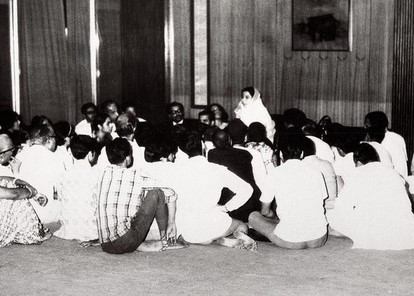
“The Paraclete will come (15:26; 16:7, 8, 13) as Jesus has come into the world (5:43; 16:28; 18:37)... The Paraclete will take the things of Christ (the things that are mine, ek tou emou) and declare them (16:14-15). Bishop Fison describes the humility of the Spirit, 'The true Holy Spirit of God does not advertise Herself: She effaces Herself and advertises Jesus.' ...
It is by the outgoing activity of the Spirit that the divine life communicates itself in and to the creation. The Spirit is God-in-relations. The Paraclete is the divine self-expression which will be and abide with you, and be in you (14:16-17). The Spirit's work is described in terms of utterance: teach you, didasko (14:26), remind you, hypomimnesko (14:26), testify, martyro (15:26), prove wrong, elencho (16:8), guide into truth, hodego (16:13), speak, laleo (16:13, twice), declare, anangello (16:13, 14, 15). The johannine terms describe verbal actions which intend a response in others who will receive (lambano), see (theoreo), or know (ginosko) the Spirit. Such speech-terms link the Spirit with the divine Word. The Spirit's initiatives imply God's personal engagement with humanity. The Spirit comes to be with others; the teaching Spirit implies a community of learners; forgetful persons need a prompter to remind them; one testifies expecting heed to be paid; one speaks and declares in order to be heard. The articulate Spirit is the correlative of the listening, Spirit-informed community.
The final Paraclete passage closes with a threefold repetition of the verb she will declare (anangello), 16:13-15. The Spirit will declare the things that are to come (v.13), and she will declare what is Christ's (vv. 14, 15). The things of Christ are a message that must be heralded...
The intention of the Spirit of truth is the restoration of an alienated, deceived humanity... The teaching role of the Paraclete tends to be remembered as a major emphasis of the Farewell Discourses, yet only 14:26 says She will teach you all things. (Teaching is, however, implied when 16:13-15 says that the Spirit will guide you into all truth, and will speak and declare.) Franz Mussner remarks that the word used in 14:26, didaskein, "means literally 'teach, instruct,' but in John it nearly always means to reveal.” (Stevick 2011, 292-7)
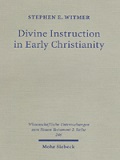
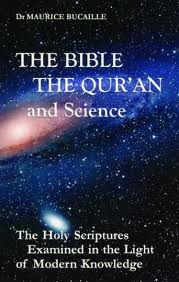
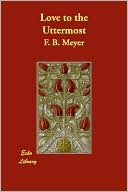
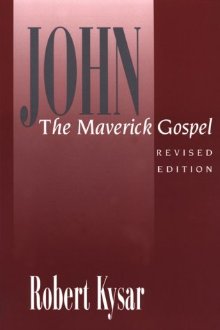
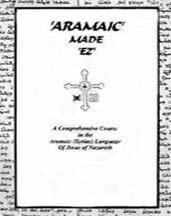
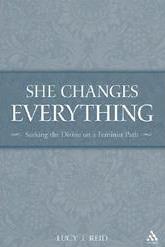
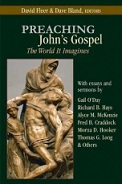
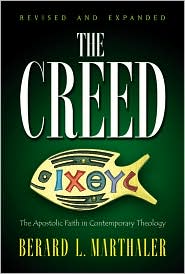
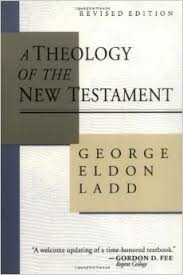
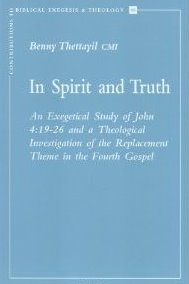

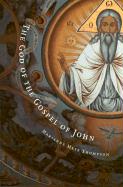
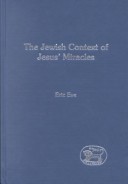
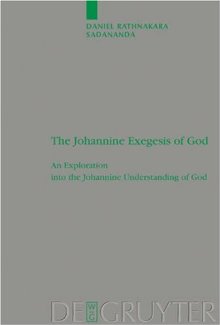
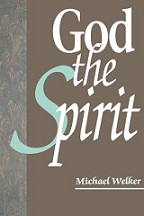
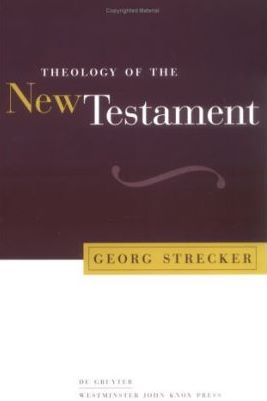
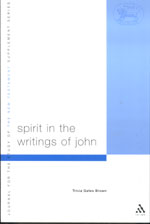
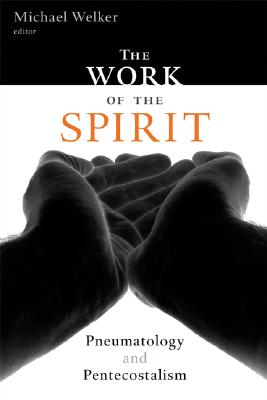
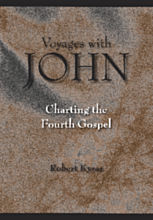
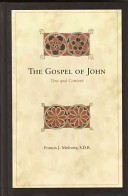
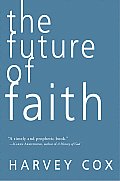
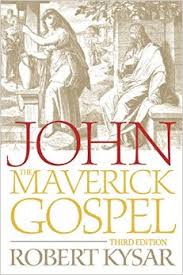
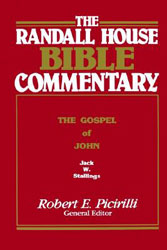

“Jesus therefore predicts that God will later send a human being to Earth to take up the role defined by John .i.e. to be a prophet who hears God's words and repeats his message to man.”
M. Bucaille, The Bible, the Qur'n, and Science
“And when Jesus foreannounced another Comforter, He must have intended a Person as distinct and helpful as He had been.”
F. B. Meyer, Love to the Utmost
“The Paraclete has a twofold function: to communicate Christ to believers and, to put the world on trial.”
Robert Kysar, John The Meverick Gospel
“But She—the Spirit, the Paraclete...—will teach you everything.”
Danny Mahar, Aramaic Made EZ)
“Grammatical nonsense but evidence of the theological desire to defeminize the Divine.”
Lucy Reid, She Changes Everything
“The functions of the Paraclete spelled out in verses 13-15... are all acts of open and bold speaking in the highest degree.”
David Fleer, Preaching John's Gospel
“The reaction of the world to the Paraclete will be much the same as the world's reaction was to Jesus.”
Berard L. Marthaler, The Creed: The Apostolic Faith in Contemporary Theology
Bultmann calls the “coming of the Redeemer an 'eschatological event,' 'the turning-point of the ages.”
G. Ladd, A Theology of the New Testament
“The Paraclete equated with the Holy Spirit, is the only mediator of the word of the exalted Christ.”
Benny Thettayil, In Spirit and Truth
“The divine Paraclete, and no lessor agency, must show the world how wrong it was about him who was in the right.”
Daniel B. Stevick , Jesus and His Own: A Commentary on John 13-17
Stephen Smalley asserts that “The Spirit-Paraclete ... in John's Gospel is understood as personal, indeed, as a person.”
Marianne Thompson, The God of the Gospel of John
“The Messiah will come and the great age of salvation will dawn (for the pious).”
Eric Eve, The Jewish context of Jesus' Miracles
“The remembrance is to relive and re-enact the Christ event, to bring about new eschatological decision in time and space.”
Daniel Rathnakara Sadananda, The Johannine Exegesis of God
“The Spirit acts in such an international situation as the revealer of 'judgment' on the powers that rule the world.”
Michael Welker, God the Spirit
The Paraclete's “Appearance means that sin, righteousness, and judgment will be revealed.”
Georg Strecker, Theology of the New Testament
“While the Spirit-Paraclete is the true broker, the brokers they rely on are impostors.”
T. G. Brown, Spirit in the writings of John
“The pneumatological activity ... of the Paraclete ... may most helpfully be considered in terms of the salvific working of the hidden Spirit.”
Michael Welker, The work of the Spirit
“The pneuma is the peculiar power by which the word becomes the words of eternal life.”
Robert Kysar, Voyages with John
“The gift of peace, therefore, is intimately associated with the gift of the Spirit-Paraclete.”
Francis J. Moloney, The Gospel of John
“This utopian hope, even when modestly expressed, links Jesus and the prophets to a much wider history of human longing.”
Harvey Cox, The Future of Faith
“Because of the presence of the Paraclete in the life of the believer, the blessings of the end-times—the eschaton—are already present.”
Robert Kysar, John
“They are going, by the Holy Spirit's power, to be part of the greatest miracle of all, bringing men to salvation.”
R. Picirilli, The Randall House Bible Commentary
“The Kingdom of God stands as a comprehensive term for all that the messianic salvation included... is something to be sought here and now (Mt. 6:33) and to be received as children receive a gift (Mk. 10:15 = Lk. 18:16-17).”
G. Ladd, A Theology of the New Testament
“But today is the day I declare that I am the one who has to save the humanity. I declare I am the one who is Adishakti, who is the Mother of all the Mothers, who is the Primordial Mother, the Shakti, the desire of God, who has incarnated on this Earth to give its meaning to itself; to this creation, to human beings and I am sure through My Love and patience and My powers I am going to achieve it.
I was the one who was born again and again. But now in my complete form and complete powers I have come on this Earth not only for salvation of human beings, not only for their emancipation, but for granting them the Kingdom of Heaven, the joy, the bliss that your Father wants to bestow upon you.”
THE MOTHER: Messiah-Paraclete-Ruh
December 2, 1979—London, UK
“I am the one about which Christ has talked... I am the Holy Spirit who has incarnated on this Earth for your realization.”
THE MOTHER: Messiah-Paraclete-Ruh
New York, USA—September 30, 1981
“Tell all the nations and tell all the people all over the Great Message that the Time of Resurrection is here. Now, at this time, and that you are capable of doing it.”
THE MOTHER: Messiah-Paraclete-Ruh
Cowley Manor Seminar, UK—July 31, 1982
“This is the transformation that has worked, of which Christ has talked, Mohammed Sahib has talked, everybody has talked about this particular time when people will get transformed.”
THE MOTHER: Messiah-Paraclete-Ruh-Devi
Chistmas Puja, Ganapatipule, India—25 December 1997
“The Resurrection of Christ has to now be collective Resurrection. This is what is Mahayoga. Has to be the collective Resurrection.”
THE MOTHER: Messiah-Paraclete-Ruh-Devi
Easter Puja, London, UK—11 April 1982
“Today, Sahaja Yaga has reached the state of Mahayoga, which is en-masse evolution manifested through it. It is this day's Yuga Dharma. It is the way the Last Judgement is taking place. Announce it to all the seekers of truth, to all the nations of the world, so that nobody misses the blessings of the divine to achieve their meaning, their absolute, their Spirit.”
THE MOTHER: Messiah-Paraclete-Ruh-Devi
MAHA AVATAR, ISSUE 1, JUL-SEP 1980 (Date and place unknown)
“The main thing that one has to understand is that the time has come for you to get all that is promised in the scriptures, not only in the Bible but all all the scriptures of the world. The time has come today that you have to become a Christian, a Brahmin, a Pir, through your Kundalini awakening only. There is no other way. And that your Last Judgment is also now.”
THE MOTHER: Messiah-Paraclete-Ruh-Devi
“You see, the Holy Ghost is the Mother. When they say about the Holy Ghost, She is the Mother... Now, the principle of Mother is in every, every scripture — has to be there. Now, the Mother's character is that She is the one who is the Womb, She is the one who is the Mother Earth, and She is the one who nourishes you. She nourishes us. You know that. And this Feminine thing in every human being resides as this Kundalini.”
THE MOTHER: Messiah-Paraclete-Ruh-Devi
Radio Interview, Santa Cruz, USA—1 October 1983
“But there is a Primordial Mother which was accepted by all the religions; even the Jews had it... In India, this is called as Adi Shakti. In every religion they had this Mother who was the Primordial Mother.”
THE MOTHER: Messiah-Paraclete-Ruh-Devi
TV Interview, Los Angeles, USA—11 October 1993
“It is the Mother who can awaken the Kundalini, and that the Kundalini is your own Mother. She is the Holy Ghost within you, the Adi Shakti, and She Herself achieves your transformation. By any talk, by any rationality, by anything, it cannot be done.”
THE MOTHER: Messiah-Paraclete-Ruh-Devi
“She is your pure Mother. She is the Mother who is individually with you. Forget your concepts, and forget your identifications. Please try to understand She is your Mother, waiting for ages to give you your real birth. She is the Holy Ghost within you. She has to give you your realization, and She's just waiting and waiting to do it.”
THE MOTHER: Messiah-Paraclete-Ruh-Devi
Public Program Mar 22 1981—Sydney, Australia
“The Kundalini is your own mother; your individual mother. And She has tape-recorded all your past and your aspirations. Everything! And She rises because She wants to give you your second birth. But She is your individual mother. You don't share Her with anybody else. Yours is a different, somebody else's is different because the tape-recording is different. We say She is the reflection of the Adi Shakti who is called as Holy Ghost in the Bible.”
THE MOTHER: Messiah-Paraclete-Ruh-Devi
Press Conference July 08 1999—London, UK
Disclaimer: Our material may be copied, printed and distributed by referring to this site. This site also contains copyrighted material the use of which has not always been specifically authorized by the copyright owner. We are making such material available to our readers under the education and research provisions of "fair use" in an effort to advance freedom of inquiry for a better understanding of religious, spiritual and inter-faith issues. The material on this site is distributed without profit. If you wish to use copyrighted material for purposes other than “fair use” you must request permission from the copyright owner.